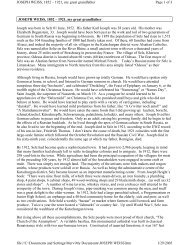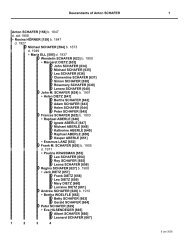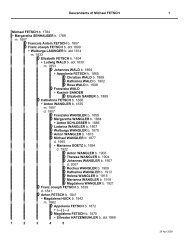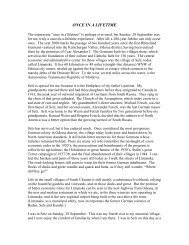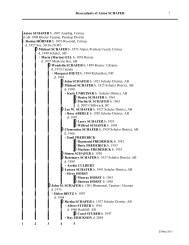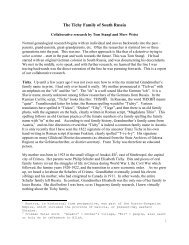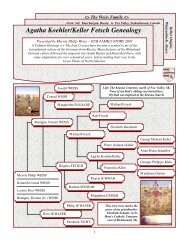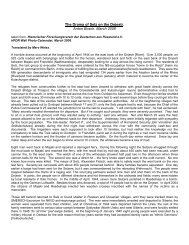Einfach abtransportiert in Stalins Arbeitslager ... - RussianRoots.ca
Einfach abtransportiert in Stalins Arbeitslager ... - RussianRoots.ca
Einfach abtransportiert in Stalins Arbeitslager ... - RussianRoots.ca
Erfolgreiche ePaper selbst erstellen
Machen Sie aus Ihren PDF Publikationen ein blätterbares Flipbook mit unserer einzigartigen Google optimierten e-Paper Software.
<strong>E<strong>in</strong>fach</strong> <strong>abtransportiert</strong> <strong>in</strong> Stal<strong>in</strong>s <strong>Arbeitslager</strong><br />
Simply Hauled Off to Stal<strong>in</strong>’s Labour Camps<br />
The Soviet bloodhounds hunted out the displaced refugee Russian-Germans <strong>in</strong> the postwar<br />
tumult – and found German supporters to help.<br />
(Written by Klaus von der Brelie)<br />
--translated by Merv Weiss from a photo-copied German magaz<strong>in</strong>e article<br />
sent to me by Ida Vetsch.<br />
1<br />
Meißendorf/W<strong>in</strong>sen. Max Haas? In Meißendorf by Celle there is hardly anyone who<br />
remembers this name. That he was mayor <strong>in</strong> 1945 <strong>in</strong> the village on the outskirts of<br />
mounta<strong>in</strong>s used as a tra<strong>in</strong><strong>in</strong>g area? “Could be”, say the young men of the village, “but he<br />
has not lived here <strong>in</strong> a long time.” Meißendorf has suppressed and forgotten what Max<br />
Haas, 60 years ago, was to answer for. The non-native man, who <strong>in</strong> the last days of the<br />
war, with support of the so-<strong>ca</strong>lled Todt Organization [see Note 1.], was named mayor of<br />
the village by the British Occupation Forces. And he helped soviet agents to search out<br />
Russian-Germans who were supposed to be sent back to the Soviet Union. Whoever<br />
resisted and did not will<strong>in</strong>gly depart <strong>in</strong> an easterly direction felt the wrath of the mayor.<br />
“Then you were forced to return at the end of a whip,” those <strong>in</strong>volved would lament, as<br />
witnesses remembered later.<br />
Many Russian-Germans <strong>in</strong> Meißendorf were <strong>in</strong>itially re-settled by the Nazis from the<br />
Black Sea and from Ukra<strong>in</strong>e to the area around Posen (“Warthegau”) under the rally<strong>in</strong>g<br />
cry “Home to the Reich”, and had fled from there out of fear towards the West ahead of<br />
the Red Army. They had received German passports, and never once imag<strong>in</strong>ed that they<br />
would travel back to their old homeland. “We are not Russians whom you <strong>ca</strong>n simply<br />
dis<strong>ca</strong>rd,” Haas would hear repeated over and over. Yet he would not allow himself to be<br />
impressed, and did whatever the Russians asked of him. So on the morn<strong>in</strong>g of 13 August<br />
1945 he set out with supporters on the march to gather up refugees and turn them over to<br />
the Russians. “Without any qualms, old men, women and children were forced, like<br />
prisoners, to the will of the partisans,” it says <strong>in</strong> a document from those former times.<br />
Meißendorf, and the fact is was over-flow<strong>in</strong>g with refugees, was not an isolated <strong>ca</strong>se.<br />
Russian-Germans were also “collected” from other villages <strong>in</strong> the adm<strong>in</strong>istrative district<br />
of Celle – like Langl<strong>in</strong>gen, Bannetze, Bockelskamp, Hornbostel, Jeverson – and <strong>in</strong>itially<br />
taken to a collection <strong>ca</strong>mp at Scheuen, close to Celle. From there they went through<br />
Lüneburg and Boitzenburg to a ma<strong>in</strong> <strong>ca</strong>mp at Neustrelitz. Here thousands were driven<br />
together and penned-up beh<strong>in</strong>d barbed wire. Transport to the East began at the end of<br />
September 1945. The trip lasted two months <strong>in</strong> constantly-locked railway box-<strong>ca</strong>rs. The<br />
dest<strong>in</strong>ation of the journey: the slave labour <strong>ca</strong>mp of Kotlas, about 800 kilometers northeasterly<br />
from Moscow. The Germans had to work there <strong>in</strong> the forests like convicts. Only<br />
ten years later, after the death of Stal<strong>in</strong> and an Amnesty, were they even allowed to leave<br />
the conf<strong>in</strong>es of the <strong>ca</strong>mps. Many, hav<strong>in</strong>g survived the imprisonment and the torment, set
2<br />
off aga<strong>in</strong> <strong>in</strong> the eighties <strong>in</strong> the direction of Germany, there to spend their rema<strong>in</strong><strong>in</strong>g years<br />
with relatives and friends <strong>in</strong> freedom.<br />
Not all of the mayors <strong>in</strong> the moorlands area followed the <strong>in</strong>structions of the Soviet<br />
officers as consistently as did Haas <strong>in</strong> Meißendorf. Christoph Armbrust <strong>in</strong> the<br />
neighbor<strong>in</strong>g village of W<strong>in</strong>sen/Aller <strong>in</strong>tervened with Celle’s Chief Adm<strong>in</strong>istrative<br />
Officer, Wilhelm He<strong>in</strong>chen, after he learned how rigorously the return process was be<strong>in</strong>g<br />
conducted <strong>in</strong> Meißendorf. He<strong>in</strong>chen appealed to the British Occupation Authority and<br />
was able to announce afterwards that the “Soviet commissars” were not allowed to exert<br />
force; only on a free-will basis could the Russian-Germans leave the South Heide<br />
moorlands [see Note 2] for the East.<br />
Still the fear of the so-<strong>ca</strong>lled commissars was great – as even the children <strong>in</strong> the overflow<strong>in</strong>g<br />
school <strong>in</strong> Garßen by Celle would learn at the end of January 1946. Their teacher,<br />
Miss Rempel, left Garßen on the spur of the moment for an unknown dest<strong>in</strong>ation, all<br />
be<strong>ca</strong>use as a Black Sea German, she wanted to avoid deportation.<br />
Some mayors recognized the fear of the refugees and the displaced. They adm<strong>in</strong>istered a<br />
“surcharge” of 30 Mark per person with which one could purchase exemption from the<br />
liability of be<strong>in</strong>g returned.<br />
Nevertheless the pursuit of the soviet officers did not abate. They could be found even <strong>in</strong><br />
villages as isolated as Obere<strong>in</strong>z<strong>in</strong>gen <strong>in</strong> the military-tra<strong>in</strong><strong>in</strong>g mounta<strong>in</strong>s. There fourteen<br />
families evaded <strong>ca</strong>pture, <strong>in</strong>itially hav<strong>in</strong>g fled to Langl<strong>in</strong>gen (Celle district). They were<br />
welcome neither there nor on the military range abandoned by the armed forces. Still<br />
they wanted to stay and aga<strong>in</strong> be farmers.<br />
They almost succeeded. In Obere<strong>in</strong>z<strong>in</strong>gen, six abandoned houses offered an almost<br />
decent accommodation; the heath soil was quickly transformed <strong>in</strong>to farmland. But the<br />
competent adm<strong>in</strong>istrator of the Achterberg district be<strong>ca</strong>me a thorn <strong>in</strong> the side for the<br />
newcomers. After he was un-successful <strong>in</strong> discourag<strong>in</strong>g the Russian Germans with all<br />
k<strong>in</strong>ds of chi<strong>ca</strong>nery, the Soviet officers set out – at first without success, then with help<br />
from British soldiers who at the end even fired warn<strong>in</strong>g shots – to enforce the claims of<br />
the Russians. Fourteen families, a total of 60 persons, were arrested and trundled out of<br />
Obere<strong>in</strong>z<strong>in</strong>gen on 06 February 1946. Anyway, very few of them succeeded <strong>in</strong> elud<strong>in</strong>g<br />
the Russians. The rest were transported as prisoners to Soviet labor <strong>ca</strong>mps <strong>in</strong> the same<br />
way as their countrymen from Meißendorf.<br />
How did it come to be then, that Soviet officers could also operate nearly un-h<strong>in</strong>dered <strong>in</strong><br />
the three western occupation zones? First, many villages and small towns were overflow<strong>in</strong>g<br />
with refugees and people displaced by the bomb<strong>in</strong>g, so that many mayors were<br />
happy about every stranger who aga<strong>in</strong> “departed”. Secondly, there was the secret<br />
agreement reached on 11 February 1945 <strong>in</strong> Yalta by the victorious powers, and more<br />
precisely specified at Halle on 21 May 1945. It specified that not only all Soviet<br />
prisoners of war and forced-laborers, who had survived Nazi rule, had to return to their<br />
homeland, but also all citizens of the Soviet Union who had been forced to leave their
3<br />
settlements by the German armed forces. For this reason those [Soviet] officers assigned<br />
to the repatriation were also given a free hand <strong>in</strong> the western zones. Up until autumn of<br />
1946 it was possible for them to pursue Russian-Germans.<br />
The “Landsmannschaft der Deutschen aus Russland” and the Federal Institute for Eastern<br />
Scientific and International Studies <strong>in</strong> Köln have attempted to document the repatriation<br />
of the Russian-Germans. The result is vague, yet nonetheless clear: Sixty years ago at<br />
least 250,000 Germans from the Soviet Union were “directed” to the East by Soviet<br />
troops and authorities. Approximately 80,000 of them es<strong>ca</strong>ped from the “bloodhounds”<br />
<strong>in</strong> the three western zones. A great many of them perished enroute be<strong>ca</strong>use they were not<br />
able to cope with the physi<strong>ca</strong>l and mental stress. But more than 140,000 Germans were<br />
“repatriated” from Germany <strong>in</strong>to the Soviet Union – by force, and not quite so friendly as<br />
the Czar<strong>in</strong>a Cather<strong>in</strong>e the Great who, s<strong>ca</strong>rcely two hundred years earlier, had brought<br />
workers and farmers from Germany to her vast empire.<br />
1. The Organisation Todt (OT) was a Third Reich civil and military eng<strong>in</strong>eer<strong>in</strong>g group <strong>in</strong> Germany<br />
named for its founder, Fritz Todt, an eng<strong>in</strong>eer and senior Nazi figure. The organization was<br />
responsible for a huge range of eng<strong>in</strong>eer<strong>in</strong>g projects both <strong>in</strong> pre-World War II Germany and <strong>in</strong><br />
occupied territories frrom France to Russia dur<strong>in</strong>g the war. From 1942 until the end of the war,<br />
Albert Speer succeeded Todt <strong>in</strong> office and the “Organisation Todt” was absorbed <strong>in</strong>to the<br />
(renamed and expanded) M<strong>in</strong>istry for Armaments and War Production. (Wikopedia)<br />
2. Die Heide refers to a large area of moors and heaths <strong>in</strong> lower Saxony, the north-east of Germany.<br />
A large nature preserve is lo<strong>ca</strong>ted <strong>in</strong> the area <strong>ca</strong>lled the Lüneburger Heide.<br />
Flight and banishment, 1945: Many Russian-Germans who fled before the<br />
Red Army towards the West were nevertheless tracked down by the Soviets<br />
<strong>in</strong> occupied Germany – and dragged back aga<strong>in</strong> to the East.
<strong>E<strong>in</strong>fach</strong> <strong>abtransportiert</strong> <strong>in</strong>s Stal<strong>in</strong>s <strong>Arbeitslager</strong>.<br />
Die sowjetischen Häscher machten <strong>in</strong> den Nachkriegswirren Jagd auf geflüchtete<br />
Russlanddeutsche – und fanden dafür deutsche Unterstützer.<br />
Von Klaus Von Der Brelie.<br />
4<br />
Meißendorf/W<strong>in</strong>sen. Max Haas? In Meißendorf bei Celle kann sich kaum jemand an<br />
diesen Namen er<strong>in</strong>nern. Dass er 1945 Bürgermeister <strong>in</strong> dem Dorf am Rande des<br />
Truppenübungsplatzes Bergen war? “Mag se<strong>in</strong>”, sagen die Jüngeren im Ort, “aber der<br />
wohnt heir schon lange nicht mehr.” Meißendorf had verdrängt und vergesen, was vor 60<br />
Jahren von Max Haas zu verantworten war. Der <strong>in</strong> den letzen Kriegstagen mit<br />
Angehörigen der so genannten Organisation Todt zugewanderte Mann war von der<br />
brittische Besatzern zum Bürgermeister ernannt worden. Und er half sowjetischen<br />
Agenten beim Aufspüren von russlanddeutschen, die <strong>in</strong> die Sowjetunion zurückgeführt<br />
werden sollten. Wer sich dagegen stäubte und nicht freiwillig <strong>in</strong> richtung Osten<br />
aufbrach, bekam den Zorn des Bürgermeisters zu spüren. “Dann werdet ihr mit der<br />
Peitsche zur Rückkehr gezwungen,” soll er die betroffenen Frauen angebrüllt haben, wie<br />
sich Zeugen später er<strong>in</strong>nerten.<br />
Viele Russlanddeutsche <strong>in</strong> Meißendorf waren unter der Parole “Heims <strong>in</strong>s Reich” von<br />
den Nazis zunächst vom Schwarzen Meer und aus der Ukra<strong>in</strong>e <strong>in</strong> den Raum Posen<br />
(“Warthega”} umgesiedelt worden und aus Angst vor der Roten Armee von dort <strong>in</strong><br />
Richtung Westen geflüchtet. Sie hatten deutsche Pässe bekommen und dachten nicht im<br />
Traum daran, <strong>in</strong> ihre alte Heimat zurückzureisen. “Wir s<strong>in</strong>d ke<strong>in</strong>e Russen, die man<br />
e<strong>in</strong>fach abschieben kann”, bekam Haas immer wieder zu hören. Doch er ließ sich auch<br />
davon nicht bee<strong>in</strong>drucken und machte, was die Russen kategorisch von ihm verlangten.<br />
So setzte er am Morgen des 13, August 1945 e<strong>in</strong>en Trecker mit Anhänger <strong>in</strong> Marsch, um<br />
die Flüchtl<strong>in</strong>ge e<strong>in</strong>zusammeln und den Russen zu übergeben. “Wie Strafgefangene<br />
wurden ohne Skrupel Griese, rauen und K<strong>in</strong>der zum Besteigen des Anhängers<br />
gezwungen”, heißt es <strong>in</strong> e<strong>in</strong>er Dokumentation über die damaligen Ereignisse.<br />
Das Geschehen <strong>in</strong> dem damals mit Flüchtl<strong>in</strong>gen überfüllten Meißendorf war Ke<strong>in</strong><br />
E<strong>in</strong>zelfall. Auch aus anderen Orten im Landkreis Celle – wie Langl<strong>in</strong>gen, Bannetze,<br />
Bockelskamp, Hornbostel, Jeversen – wurden Russlanddeutsche “abgeholt” and zunächst<br />
<strong>in</strong> e<strong>in</strong> Sammellager nach Scheuen bei Celle gebracht. Von dort g<strong>in</strong>g es über Lüneburg<br />
und Boitzenburg <strong>in</strong>s Hauptlager nach Neustrelitz. Hier wurden Tausende<br />
zusammengetrieben und h<strong>in</strong>ter Stacheldrahtverhauen zusammengepfercht. Ende<br />
Septmber 1945 begann der Abtransport <strong>in</strong> Richtung Osten. Zwei Monate dauerte die<br />
Reise <strong>in</strong> fast ständ<strong>in</strong>g verschlossenen Eisenbahnwaggons. Endstation der Fahrt: das<br />
Zwangsarbeitslager Kotlas, rund 800 Kilometer nordostwärts von Moskau. Wie<br />
Strafgefangene mussten die Deutschen dort <strong>in</strong> den Wäldern arbeiten. Erst zehn Jahre<br />
später, nach dem Tod Stal<strong>in</strong>s und e<strong>in</strong>er Amnestie, durften sie sich auch außerhalb der<br />
Lager aufhalten. E<strong>in</strong>gie, die Haft und Qualen überlebt haben, s<strong>in</strong>d <strong>in</strong> den achtziger<br />
Jahren e<strong>in</strong> zweites Mal <strong>in</strong> Richtung Deutschland aufgebrochen, um ihren Lebensabend<br />
bei Verwandeten und Freunden <strong>in</strong> Freiheit zu verbr<strong>in</strong>gen.
Denn längst nicht alle Bürgermeister <strong>in</strong> der Heide folgten den Anweisungen der<br />
Sowjetoffiziere so consequent wie Haas <strong>in</strong> Meißendorf. Christoph Armbrust im<br />
Nachbardorf W<strong>in</strong>sen/Aller etwa schaltete den Celler Landrat Wilhelm He<strong>in</strong>chen e<strong>in</strong>,<br />
nachdem er erfahren hatte, wie rigoros die Rückführung <strong>in</strong> Meißendorf e<strong>in</strong>geleitet<br />
worden war. He<strong>in</strong>ichen wandte sich an die britische Besatzungsmacht und konnte<br />
anschließend verkünden, die “Sowjetkommissare” dürften ke<strong>in</strong>en Zwang ausüben, nur<br />
auf freiwilliger Basis könnten die Russlanddeutsche die Südheide wieder <strong>in</strong> Richtung<br />
Osten verlassen.<br />
5<br />
Die Angst vor den so genannten Kommissaren war dennoch groß – wie auch die K<strong>in</strong>der<br />
<strong>in</strong> der überfüllten Schule <strong>in</strong> Garßen bei Celle Ende Januar 1946 erfuhren. Ihre Lehrer<strong>in</strong><br />
“Fraule<strong>in</strong> Rempel”, verließ Garßen mit unbekannten Ziel Hals über Kopf, nur weil sie als<br />
Schwarzmeerdeutsche der Rückführung entgehen wollte.<br />
E<strong>in</strong>ige Bürgermeister erkannten die Ängste der Flüchtl<strong>in</strong>ge und Vertriebenen. Sie<br />
führten e<strong>in</strong>e “Strafgebühr” von 30 Mark e<strong>in</strong>, mit der man sich von der Pflicht zur<br />
Rückkehr freikaufen konnte.<br />
Dennoch ließen die Nachstellungen der Sowjetoffiziere nicht nach. Selbst <strong>in</strong> so<br />
abgelegenen Dörfern wie Obere<strong>in</strong>z<strong>in</strong>gen auf dem Truppenübungsplatz Bergen wurden sie<br />
fündig. Dorth<strong>in</strong> hatte es 14 Familien verschlagen, die zunächst nach Langl<strong>in</strong>gen (Kreis<br />
Celle) geflüchtet waren. Willkommen waren sie weder dort noch auf dem von der<br />
Wehrmacht verlassesen Schießplatz. Doch sie wollten bleiben, wieder Landwirtschaft<br />
betreiben.<br />
Es hätte auch gel<strong>in</strong>gen können. In Obere<strong>in</strong>z<strong>in</strong>gen boten sechs verlassene Häuser e<strong>in</strong>e<br />
halbwegs angenehme Unterkunft, der Heideboden war schnell <strong>in</strong> Ackerland verwandelt.<br />
Doch der zuständige Gutsverwalter im Bezirk Achterberg machte den Neuankömml<strong>in</strong>gen<br />
e<strong>in</strong>e Strich durch die Rechnung. Nachdem es ihm nicht gelungen war, die<br />
Russlanddeutschen mit allerlei Schikanen zu vergraulen, sezten ihnen die Sowjetoffiziere<br />
zu – anfangs ohne Erfold, dann mit Hilfe britischer Soldaten, die am Ende sogar<br />
Warnschüsse abfeuerten, um die Forderungen der Russen durchzusetzen. 14 Familien,<br />
<strong>in</strong>gesamt 60 Menschen, wurden am 6. Februar 1946 aus Obere<strong>in</strong>z<strong>in</strong>gen verschleppt.<br />
Immerh<strong>in</strong>, e<strong>in</strong>igen wenigen von ihnen gelang es, den Russen zu entkommen. Wie<br />
Gefangene wurden die Übrigen auf demselben Weg <strong>in</strong> sowjetische <strong>Arbeitslager</strong><br />
transportiert wie ihre Landsleute aus Meißendorf.<br />
Woran lag es, dass Sowjetoffiziere auch <strong>in</strong> den drei westlichen Besatzungszonen quasi<br />
ungeh<strong>in</strong>dert agieren konnten? Zum e<strong>in</strong>en waren viele Dörfer und Kle<strong>in</strong>städte mit<br />
Flüchtl<strong>in</strong>gen und Ausgebombten überfüllt, so dass mancher Bürgermeister froh war über<br />
jeden Fremde, der wieder “abrieste”. Zum anderen gab es e<strong>in</strong>en Geheimvertrag, den die<br />
Siegermächte am 11. Februar 1945 <strong>in</strong> Jalta beschlossen und am 21. Mai 1945 <strong>in</strong> Halle<br />
präzisiert hatten. Er legte fest, dass nicht nur alle sowjetischen Kriegsgefangenen und<br />
Zwangsarbeiter, die die Nazizeit überlebt hatten, <strong>in</strong> ihre Heimat zurückkehren mussten,<br />
sondern auch alle Bewohner der Sowjetunion, die von der Wehrmacht zum Verlassen<br />
ihrer Siedlungen gezwungen worden waren. Den mit der Rückführung beauftragten
Offizieren war damit auch <strong>in</strong> den Westzonen freie Hand gegeben. Bis zum Herbst 1946<br />
war es ihnen möglich, auch Russlanddeutsche aufzuspüren.<br />
6<br />
Die Landsmannschaft der Deutschen aus Russland und das Bundes<strong>in</strong>stitut für<br />
ostwissenschaftliche und <strong>in</strong>ternationale Studien <strong>in</strong> Köln haben versucht, die Rückführung<br />
der Russlanddeutschen zu dokumentieren. Das Ergebnis ist vage, aber doch e<strong>in</strong>deutig:<br />
M<strong>in</strong>destens 250 000 Deutsch aus der Sowjetunion s<strong>in</strong>d vor 60 Jahren von sowjetischen<br />
Truppen und Behörden aus Deutschland nach Osten “dirigiert” worden. Etwa 80 000 von<br />
ihnen s<strong>in</strong>d den “Häschern” <strong>in</strong> den drei Westzonen entkommen. Sehr viele s<strong>in</strong>d auf dem<br />
Transport zu Tode gekommen, weil sie den körperlichen oder seelischen Strapazen nicht<br />
gewachsen waren. Aber es werden mehr als 140 000 Deutsche gewesen se<strong>in</strong>, die aus<br />
Detschland <strong>in</strong> die Sowjetunion “repatriiert” wurden – gewaltsam und längst nich so<br />
freundlich, wie die Zar<strong>in</strong> Kathar<strong>in</strong>a die Große knapp 200 Jahre zuvor Arbeiter und<br />
Bauern aus Deutschland <strong>in</strong> ihr weites Reich gehold hatte.<br />
Das Ende.



